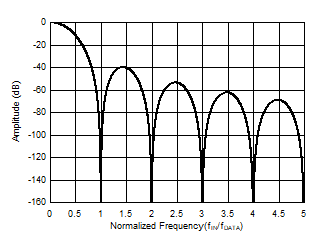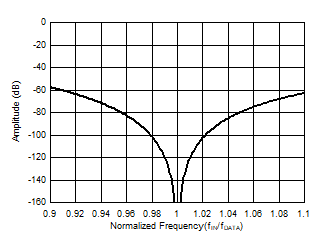JAJSLQ5C April 2021 – September 2022 ADS127L11
PRODUCTION DATA
- 1 特長
- 2 アプリケーション
- 3 概要
- 4 Revision History
- 5 Pin Configuration and Functions
-
6 Specifications
- 6.1 Absolute Maximum Ratings
- 6.2 ESD Ratings
- 6.3 Recommended Operating Conditions
- 6.4 Thermal Information
- 6.5 Electrical Characteristics
- 6.6 Timing Requirements (1.65 V ≤ IOVDD ≤ 2 V)
- 6.7 Switching Characteristics (1.65 V ≤ IOVDD ≤ 2 V)
- 6.8 Timing Requirements (2 V < IOVDD ≤ 5.5 V)
- 6.9 Switching Characteristics (2 V < IOVDD ≤ 5.5 V)
- 6.10 Timing Diagrams
- 6.11 Typical Characteristics
- 7 Parameter Measurement Information
-
8 Detailed Description
- 8.1 Overview
- 8.2 Functional Block Diagram
- 8.3 Feature Description
- 8.4 Device Functional Modes
- 8.5 Programming
- 8.6
Registers
- 8.6.1 DEV_ID Register (Address = 0h) [reset = 00h]
- 8.6.2 REV_ID Register (Address = 1h) [reset = xxh]
- 8.6.3 STATUS Register (Address = 2h) [reset = x1100xxxb]
- 8.6.4 CONTROL Register (Address = 3h) [reset = 00h]
- 8.6.5 MUX Register (Address = 4h) [reset = 00h]
- 8.6.6 CONFIG1 Register (Address = 5h) [reset = 00h]
- 8.6.7 CONFIG2 Register (Address = 6h) [reset = 00h]
- 8.6.8 CONFIG3 Register (Address = 7h) [reset = 00h]
- 8.6.9 CONFIG4 Register (Address = 8h) [reset = 00h]
- 8.6.10 OFFSET2, OFFSET1, OFFSET0 Registers (Addresses = 9h, Ah, Bh) [reset = 00h, 00h, 00h]
- 8.6.11 GAIN2, GAIN1, GAIN0 Registers (Addresses = Ch, Dh, Eh) [reset = 40h, 00h, 00h]
- 8.6.12 CRC Register (Address = Fh) [reset = 00h]
- 9 Application and Implementation
- 10Device and Documentation Support
- 11Mechanical, Packaging, and Orderable Information
パッケージ・オプション
メカニカル・データ(パッケージ|ピン)
サーマルパッド・メカニカル・データ
- RUK|20
発注情報
8.3.5.2.3 Sinc3 Filter
The sinc3 filter mode is a single-stage filter. Relatively high values of OSR provide line-cycle rejection with data rates = 480 SPS, 400 SPS, 60 SPS, and 50 SPS. Because of the large width of the frequency response notch, excellent line-frequency NMRR and CMRR can be achieved with this filter. Table 8-7 summarizes the characteristics of the sinc3 filter.
Table 8-7 Sinc3 Filter
Characteristics
| OSR | DATA RATE (SPS) | –3-dB FREQUENCY (Hz) | LATENCY (ms) | REJECTION OF FIRST NULL (dB) | |
|---|---|---|---|---|---|
| 2% CLOCK TOLERANCE | 6% CLOCK TOLERANCE | ||||
| HIGH-SPEED MODE (fCLK = 25.6 MHz) | |||||
| 26667 | 480 | 126 | 6.25 | 100 | 71 |
| 32000 | 400 | 105 | 7.50 | 100 | 71 |
| LOW-SPEED MODE (fCLK = 3.2 MHz) | |||||
| 26667 | 60 | 15.7 | 50.01 | 100 | 71 |
| 32000 | 50 | 13.1 | 60.01 | 100 | 71 |
Figure 8-17 shows the frequency response of the sinc3 filter (OSR = 32000). Figure 8-18 shows the detailed response in the region of 0.9 to 1.1 · fIN / fDATA.
 Figure 8-17 Sinc3 Frequency Response
Figure 8-17 Sinc3 Frequency Response
(OSR = 32000)
 Figure 8-18 Detail Sinc3 Frequency Response (OSR = 32000)
Figure 8-18 Detail Sinc3 Frequency Response (OSR = 32000)